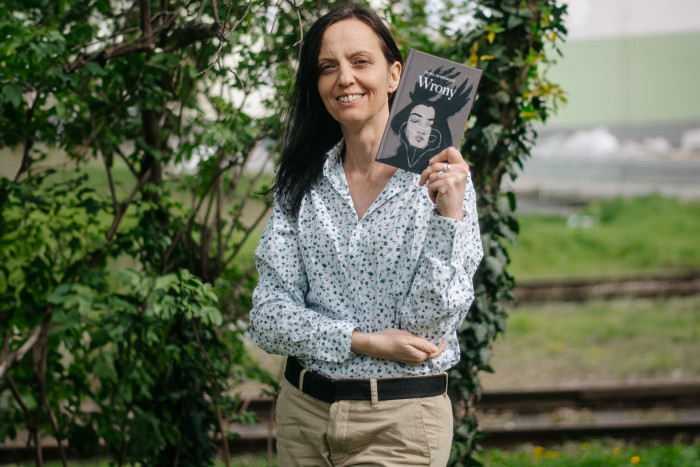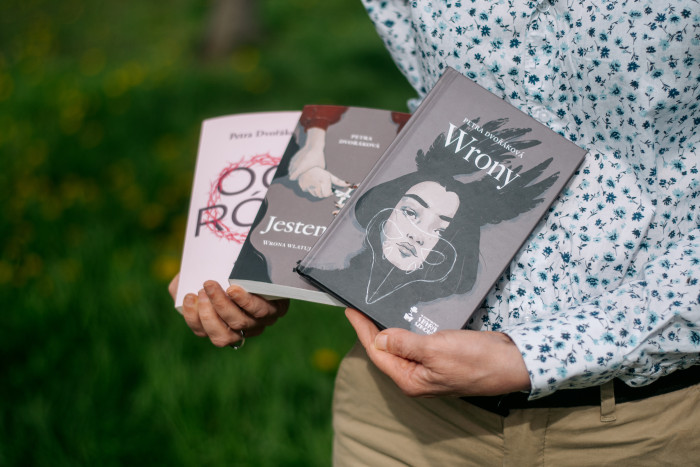
In Poland it’s being talked about as an unprecedented success and a phenomenal discovery from the Czech Republic. The writer Petra Dvořáková is now a bestseller on the extensive Polish book market thanks to the translation of her novel Crows / Vrány, or Wrony in Polish.
It was published four years ago by Stara szkoła, a publishing house specializing in Czech and Slovak authors. “Although we are neighbours, contemporary Czech authors are not very well known in Poland, even if Petra Dvořáková is indeed among the exceptions, as is Evžen Boček. Their books sell tens of thousands of copies,” explains Mirosław Śmigielski, the publisher’s owner and a translator from Czech.
Crows tells twelve-year-old Bára’s intimate story, which is deeply poignant and very cogently compels parent readers to consider their role. “We originally planned to publish Petra’s novel The Village / Dědina first, but then Crows came out in the Czech Republic, and I knew right away that this particular book had to be published in Poland first. It affected me deeply and changed my views on children’s upbringing. I’ve got three, and when things get tough, I always think back to Crows, which gives me a lot of strength. I believe that Petra has influenced tens of thousands of Poles, and I am grateful to her for that. Crows is one of those books that can make a real difference in the world,” explains the Polish publisher.
I am a crow…
“Even in the first year following the publication of Crows in Poland, the book was clearly gaining interest among Polish readers. I started to receive messages from my Polish publisher, and I also noticed that there were more and more fans of the Polish translation on social media. However, it finally dawned on me two years ago at a fair in Krakow, where crowds of readers were waiting for me; I will never forget that book signing. Perhaps it was there that I first realized why the book resonated so much,” explains author Petra Dvořáková, adding that “Crows tells the story of a girl on the verge of adolescence, who is being raised by narcissistic parents, which is a big topic these days, and not just in this country. What’s more, this book is not restricted to the Czech way of life – it can easily be transposed anywhere else. Perhaps it resonates even more in Catholic Poland, because the drive to keep up appearances, no matter what’s going on under the hood, is enormous in many families there. A lot of young people spontaneously say to me in personal encounters here and in Poland: I am a crow...”
At the Krakow fair, teenage girls in particular stood in a long queue for Petra Dvořáková’s autograph. And the author also found “her” Polish fans at this year’s March book festival in Ostrava (a city in the Czech Republic, close to the border with Poland; translator’s note).

Secrets of success
Petra Dvořáková’s books have already sold over thirty thousand copies in Poland, The Garden / Zahrada and I Am Hunger / Já jsem hlad have just been published in Polish translation, The Village, mentioned above, is about to be published this year, and the Stara szkoła publishing house has now bought the rights to The Surgeon and Wild Cherry Trees. What is behind Petra Dvořáková’s success and why does she resonate so much in Poland? “Stara szkoła publishing house is very active on social media, and maybe that’s why the book is selling so well and resonates with a younger audience. It could be the social networks, but it could also be that Polish society is in some ways even more conservative than ours is, and the girls there don’t have that much of an opportunity to confide in someone, but they are told at home and in church to conform and not to stand out. The fact that they feel they are ‘crows’ is actually not good news, and the fact that the subject of the book has impressed them in particular says something sad about Polish society. “One should actually be rather sad about how successful Crows is in Poland,” says literary agent Dana Blatná, who is in charge of selling the rights to translate Czech authors abroad. She confirms that Petra Dvořáková's success in Poland has been gigantic: “At the fair in Krakow, it looked a bit like a rock star’s arrival just before Petra Dvořáková's book signing, at least from what I've seen on the social media videos,” she says somewhat hyperbolically. And Mirosław adds: “The success of a Czech author abroad depends on the interplay of many factors – the quality of the text, the cover, the timing, the promotion, the target audience, and luck to some extent too. I think even the wording of the author's name, the book title and other things that are not even visible at first glance also play a role. However, the most important factor is the emotion that the text evokes, which in the case of Petra Dvořáková, often involves pain and yet understanding. The secret of success is nothing more than the fact that readers like the book so much that they then recommend it to friends and family or on social media. Crows very often appears on Polish Instagram, and this is the most effective advertising for the book.” This is confirmed by the mechanism known in the Czech Republic as ‘šeptanda’ (the grapevine), which every Czech publisher knows they cannot do without.
At the same time, there is clearly no direct marketing behind it, but rather a kind of alchemy. That is to say that at a certain moment the book ‘captures’ the mood of the readers, the topics they are currently dealing with in their lives, and that they simply talk about the book among themselves... “It also has to be said that this success in Poland would never have happened without the immense commitment of Mirek Śmigielski, who both translated and published the book. His tireless work on social media, where he not only promoted the book but also corresponded with readers, was absolutely brilliant. And, of course, the fantastic illustration on the cover by Tereza Basařová has a large part to play. These are all circumstances that have to come together for something like this to happen. I am definitely going to Poland for several readings, one of which is the festival in Kladsko, organized by Olga Tokarczuk, but I will also be going to other cities such as Łódź and Wrocław, and I’m looking forward to the autumn fair in Krakow again,” concludes the writer Petra Dvořáková.
Petra Dvořáková’s success in Poland is all the more significant when you consider just how complicated it is for Czech authors to break through on any foreign market. As a small language, Czech places great demands on translators, and if a book does manage to be translated and sold ‘out there’, usually thanks to support grants, it usually does not sell more than a few hundred copies, perhaps a higher three-figure number. The thirty thousand books sold by Petra Dvořáková in Poland are thus a bit of a revelation.
(Source: Klára Kubíčková, Vrány Petry Dvořákové bodují v Polsku, slightly amended, translated by Melvyn Clarke)
15. 4. 2024